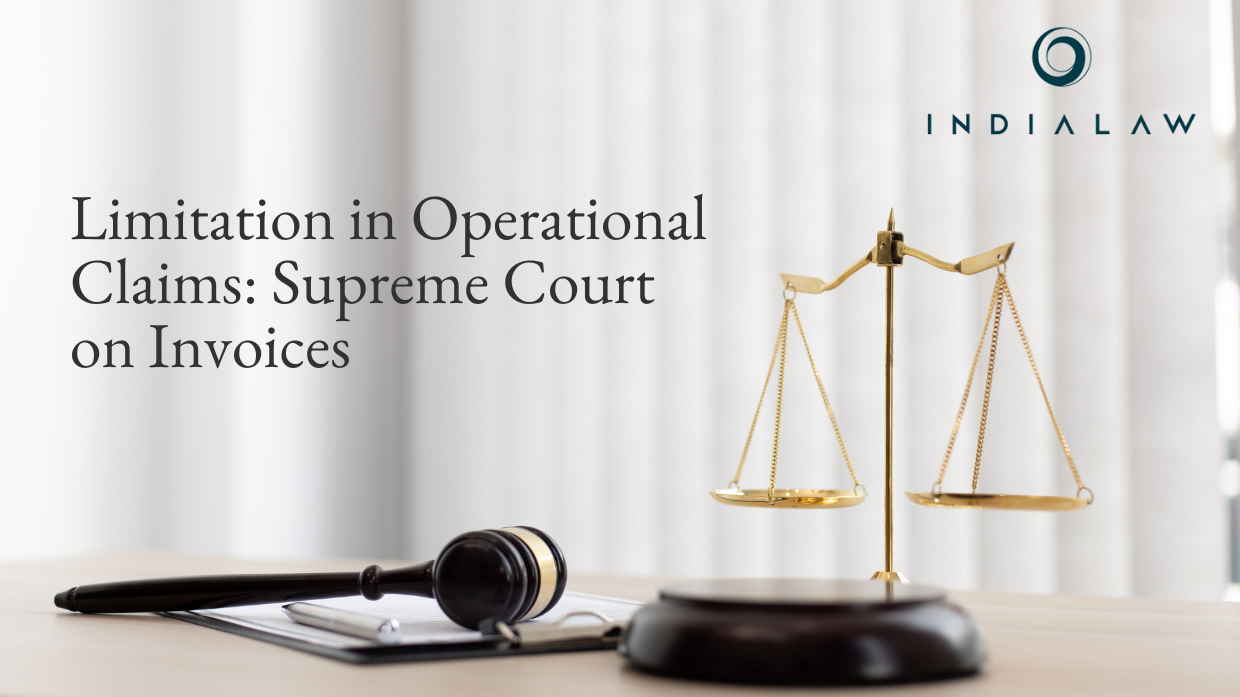In Operational Claims Arising Out Of Several Invoices, Those Invoices Falling Within The Three-Year Period Preceding The Date Of Filing Should Be Considered For The Purposes Of Limitation: Supreme Court

The Hon’ble Division Bench, Supreme Court of India, comprising of Justice Shri. Mukesh Kumar Rasikbhai Shah and Justice Shri C.T Ravikumar in the matter of M/s. Next Education India Pvt. Ltd. Vs. M/s. K12 Techno Services Pvt. Ltd (Civil Appeal No. 1775 of 2021), vide Order dated 27.03.2023 held that when a Company Petition is filed under Section 9 of the Insolvency and Bankruptcy Code (“IBC”) on the basis of several invoices wherein some of the invoices are time barred, then the Adjudicating Authority must consider Invoices raised at least three years prior to the date of filing of the Company Petition under section 9 of the IBC to determine limitation.
Facts:
M/s. Next Education India Pvt. Ltd (“Operational Creditor”) raised 187 invoices in respect of digital classroom solution services provided to one, M/s. K12 Techno Services Pvt. Ltd (“Corporate Debtor”) for period between 12.03.2011 to 30.06.2017. The Operational Creditor issued Demand Notice u/s 8 of the IBC wherein the date of default under the first invoice was mentioned as 12.03.2011. Subsequently, the Operational Creditor in 2017 initiated proceedings under Section 9 of the IBC before the Hon’ble National Company Law Tribunal (“NCLT”), Bengaluru Bench wherein the date of default was mentioned as 30.06.2017 on the basis of amount unpaid under certain invoices raised in June 2017.
However, the Hon’ble NCLT dismissed the Company Petition on the grounds of a Pre-Existing Dispute and the claim being time-barred. Aggrieved by the same the Operational Creditor approached the Hon’ble National Company Law Appellate Tribunal (“NCLAT”), by way of Company Appeal (AT) (Insolvency) No.98/2019. The Hon’ble NCLAT vide Order dated 01.08.2019 while observing that there was no pre-existing dispute involved, set aside the impugned order and remitted the matter back to the Hon’ble NCLT for admission u/s 9 of the IBC.
Thereafter, the Corporate Debtor preferred Civil Appeal No. 7646/2019 before the Hon’ble Apex Court. The Hon’ble Apex Court while allowing the said Appeal directed the Hon’ble NCLAT to consider all contentions and issues afresh. In compliance, of the same the Hon’ble NCLAT vide dated 17.03.2021(“impugned order”) held that the date of default cannot be construed differently merely because it is mentioned as 12.03.2011 in the Demand Notice and as30.06.2017 in the Application u/s 9 since an Application u/s 9 emanates from the Demand Notice issued u/s 8, and the Sections are to be read conjointly. As such, the date of default shall be 12.03.2011 and accordingly, 3 years of limitation period thereof expired on 12.03.2014.
Further, the Hon’ble NCLAT rejected the contention of learned Counsel for the Operational Creditor that Petition is well within limitation on the basis of earliest invoices raised in three years preceding 26.10.2017 (date of filing of Application u/s 9) being Invoices dated 02.04.2015 and 30.06.2017, which meet the prescribed threshold requirements u/s 9 of the IBC, by stating that time-period for the purpose of limitation cannot be confined to preceding 3 years when Original date of default is in March 2011.
The Tribunal cannot consider only certain invoices for the purpose of limitation when all the Invoices are annexed to the Demand Notice to arrive at the claim amount as the Tribunal does not have jurisdiction in Insolvency Proceedings to cut-short the Invoices which would cause recurring dates of cause of action as the intention of the legislature under the IBC is not recovery oriented.
The aforesaid Order dated 17.03.2021 was challenged by way of the present Appeal before the Hon’ble Supreme Court.
Findings of the Hon’ble Supreme Court:
The Hon’ble Supreme Court while setting aside impugned Orders passed by the Hon’ble NCLT and NCLAT dismissing the Application filed u/s 9 of the IBC on the ground of the claim being time-barred and expiry of Limitation period categorically stated that the Hon’ble NCLT should have considered invoices raised subsequently at least 3 years prior to the date of Application u/s 9 for determining limitation period. Relevant extract from Order dated 27.03.2023 is produced hereunder for easy reference:
“……The NCLT considering the starting point of limitation as 12.03.2011 held that the claim is barred by limitation. However, the NCLT did not take into consideration the subsequent invoices at least preceding three years from the date of filing of Section 9 application, which ought to have been considered. Under the circumstances, the NCLT ought to have considered the invoices at least for the period preceding three years from the date of application under Section 9, rather than considering the starting point of limitation as 12.03.2011. Under the circumstances, the order(s) passed by the NCLT and affirmed by the NCLAT are unsustainable.”
In conclusion, the Hon’ble Supreme Court has settled the law with respect to determination of limitation period where Application under Section 9 of the IBC has been filed on the basis of several invoices.
By entering the email address you agree to our Privacy Policy.



